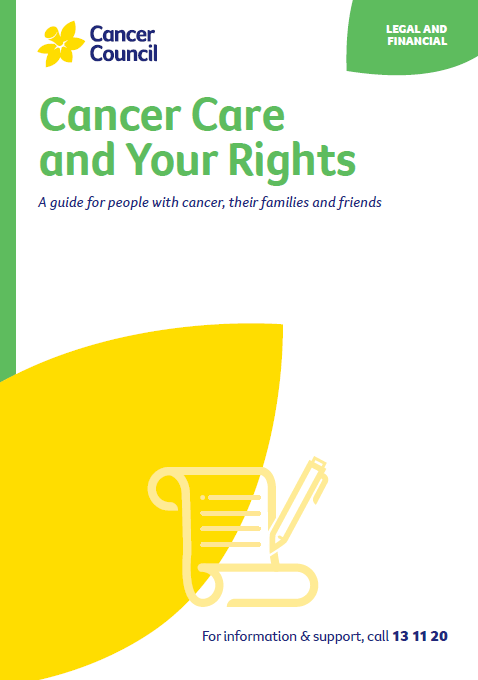- Home
- About Cancer
- Coping with a diagnosis
- Cancer care and your rights
- Making treatment decisions
- Getting a second opinion
Getting a second opinion
Finding a specialist and deciding on treatment can be difficult. You have the right to talk to more than one specialist about your treatment options or to confirm the recommended treatment. Called a second opinion, this may help reassure you that you have explored all of your options.
Learn more about:
Overview
A second opinion may also be helpful for people who face a choice between high-risk treatment that has a chance of a better outcome, and lower-risk treatment that is less likely to be successful.
Not everyone will want to get a second opinion. However, some people would like a second opinion but don’t ask for one. This may be because they don’t realise that this is an option, or because they don’t want to upset the specialist they’ve already seen.
Reasons for getting a second opinion
Reasons you may want to get a second opinion include:
- finding peace of mind
- ensuring you receive up-to-date advice and treatment
- getting a different point of view
- joining or finding out about a clinical trial
- exploring and challenging advice from your first doctor
- not feeling at ease with your first doctor.
Finding another specialist
You can seek a second opinion by asking:
- your specialist – many are happy to recommend another doctor
- your GP – if you don’t feel comfortable asking the specialist for a referral for a second opinion, you can go back to your GP
- treatment centre staff – one of the nurses at your treatment centre can give you a list of specialists who work at that location. Your GP can then write a referral to the specialist of your choice.
Seeking another opinion
- You have the right to ask for as many opinions as you need. You will need a valid referral from your GP or specialist to claim some money back on Medicare for these appointments.
- Doctors aren’t allowed to discriminate against people for requesting a second opinion.
- You don’t have to tell your specialist that you are seeking a second opinion, but it might help if you do. Most doctors understand the value of a second opinion and may be able to help you find someone.
- Some specialists who have a heavy workload don’t accept patients for a second opinion or may charge more.
- Second opinions can take time. It may take a while to be referred to the new specialist and to get an appointment with them.
- Once you find someone to give you a second opinion, your first specialist should share your test results with them.
- If you are a public patient, you may only be allowed to be on a waiting list to see a specialist at one hospital at a time. Your doctor may also not be able to refer you to another specialist in the same hospital.
- You can get a second opinion even if you have started treatment.
- You might decide to be treated by the first doctor or you may prefer to be treated by the second specialist.
- You may be able to get some financial support if you need to travel a certain distance to get a second opinion. All state and territory governments have travel assistance programs.
- If you are being treated in the public system, you can get a second opinion from a private specialist, but check first how much this will cost.
→ READ MORE: Treatment guidelines
I wasn’t happy with the treatment option recommended by the first specialist my GP referred me to, so I asked for a second opinion. I decided it was my life and my choice.
Vivien
Podcast: Coping with a cancer diagnosis
Listen to more of our podcast for people affected by cancer
More resources
Prof Sarah Lewis, Faculty of Medicine and Health, The University of Sydney, NSW; Kevin Bloom, Senior Social Worker, Haematology and Bone Marrow Transplant, Royal North Shore Hospital, NSW; Danielle Curnoe, Consumer; Alana Fitzgibbon, Clinical Nurse Consultant – Gastro-Intestinal Cancers, Cancer Services, Royal Hobart Hospital, TAS; Hall & Wilcox (law firm); Johanna Jordaan, Consumer; Dr Deme Karikios, Medical Oncologist, Nepean Cancer and Wellness Centre, Nepean Hospital, NSW; Melissa Lawrie, Breast Cancer Clinical Nurse, Cancer Services, Gold Coast Hospital and Health Service, QLD; Jacqueline Lesage, Consumer Reviewer, Cancer Voices NSW; McCabe Centre for Law and Cancer, VIC; Louise Pellerade, 13 11 20 Consultant, Cancer Council WA; Andrew Potter, Consumer; Siân Slade, PhD Candidate, Nossal Institute for Global Health and Non-Executive Director (health, disability sectors), VIC; Paula Watt, Clinical Psychologist, WOMEN Centre, WA.
View the Cancer Council NSW editorial policy.
View all publications or call 13 11 20 for free printed copies.

